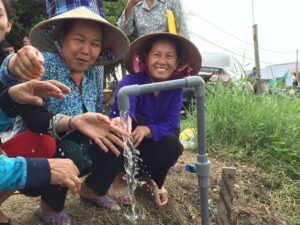By Christina Ameln, CSR | Sustainability Advisor –
2018 is the year of the Earth Dog which also means traits such as honesty, friendliness and trustworthiness are in the forefront for those that follow the Chinese horoscope. Under these signs, I look forward to continue to introduce the pioneers of Sustainability, CSR and in the Community who care and engage deeply on these topics.
First up this year, is Heineken Vietnam that has been working hard to ensure their words “Brewing a Better World” has a sincere impact in the region. Matt Wilson, Corporate Affairs Director presents the company’s work on Sustainability and addresses all points from reducing its CO2 emissions to advocating responsible consumption.
In this segment, the focus will be on Heineken’s sustainability agenda, how it connects the dots between international and local guidelines; and how they work to improve its processes to ensure positive impact.
In the follow-up segment (coming out next week), Matt Wilson will acquaint us to how the company works on responsible drinking, how it strives to be best in class; and finding inspiration even with challenges around them.
Happy reading!
Matt Wilson, Corporate Affairs Director, Heineken Vietnam
Let’s talk about “Brewing a Better World”
Aptly named, “Brewing a Better World”, our sustainability agenda, focuses on our big six focus areas:
- reducing water consumption and protecting water resources;
- reducing CO2 emissions;
- advocating responsible consumption;
- sourcing sustainably (including locally wherever possible);
- promoting health and safety; and
- supporting our communities.
You need a lot of energy and water to brew beer so the first two speak for themselves. The misuse of alcohol is an issue for society and we very much want to (and need to) lead on being part of the solution. Here in Vietnam, drink-driving is a big issue in particular so a lot of our focus goes on changing behaviours and attitudes towards drink-driving.
Ensuring our products are sourced sustainably, and our suppliers are held to the same high standard we hold ourselves, is very important to us. By sourcing nearly all of our packaging materials in particular from within Vietnam also means we contribute more to the local economy.
Health and Safety is an absolute no-brainer (excuse the pun!). Safety standards have some way to go in Vietnam but we can lead by example here and ensure our people are our first priority – as anyone who has visited Vietnam would understand, road safety is a particular focus area.
Finally, community support remains very important as well. In a developing country like Vietnam, I think there is even more need to ensure we are playing our part in supporting at-risk communities, above and beyond the financial contribution and jobs we create. Often this goes hand-in-hand with our other key issues, such as helping to provide clean water or driving greater awareness around water quality issues in areas heavily affected by climate change, such as the Mekong Delta.
How does Heineken Vietnam connect international guidelines to local ones?
International guidelines tend to be either a minimum standard or a target. Put simply, in the case of minimum standards, we always work to whatever is the higher standard – whether our international standard or the local standard. For instance, if our international standard on waste water treatment exceeds local legal requirements, we will exceed the local legal requirements in order to meet our international standard.
In terms of targets, the problem with global targets is that they are averages – picking up the best performers as well as the other end of the spectrum. If we are best in class in a particular category (like we are here in terms of CO2 emissions and water consumption), that doesn’t stop us from wanting to continually improve our performance and go further.
Thanks to things like switching to biomass to provide the thermal energy at our breweries in Vietnam, we have managed to be years ahead of our global targets, but that hasn’t reduced the ambition to reduce our CO2 emissions further still.
Explain how Heineken Vietnam has worked to improve internal processes to limit its impact environmentally and increase its impact socially?
It’s a combination of setting ambitious targets and also utilizing efficiency processes like TPM. If you are only focused on incremental efficiency gains you may miss a bigger opportunity to make a step change, but equally processes like TPM help you to continually strive for improvement even after achieving great results.
One of our biggest successes in recent years in terms of environmental impact has come from shifting from using diesel boilers to using biomass to generate our thermal energy requirements. These biomass plants are 100% CO2 neutral as utilize waste material like rice husk which not only absorb the CO2 they release when burned as fuel during their lifetime, but in many cases would have been burned anyway if we didn’t use them.
What started as a CO2 reduction and cost-saving initiative at one brewery has been progressively rolled out at all of our breweries and has enabled us to not only reduce our CO2 emissions in production by more than 50% in the past two years but also provides valuable income to the rice farmers who get paid for the husks and saves us money.
It’s a genuine win-win-win and we’re now looking to see if we can go one step further and generate renewable electricity from biomass as well to complement our existing mix of biomass, solar and biogas.
For the next instalment click – How Heineken Vietnam is “Brewing a Better World” (2/2).
- For more information on Matt Wilson, Director of Corporate Affairs, Heineken Vietnam: https://www.linkedin.com/in/matt-wilson-254300a0/
- For more information on Heineken Vietnam: http://heineken-vietnam.com.vn/en/sustainability/
- For more information on Heineken: http://www.theheinekencompany.com/sustainability
- For more information on CSR, Sustainability and Community Engagement consultancy company visit – Ameln & Co AB
First published on January 25, 2018 on Linkedin.


